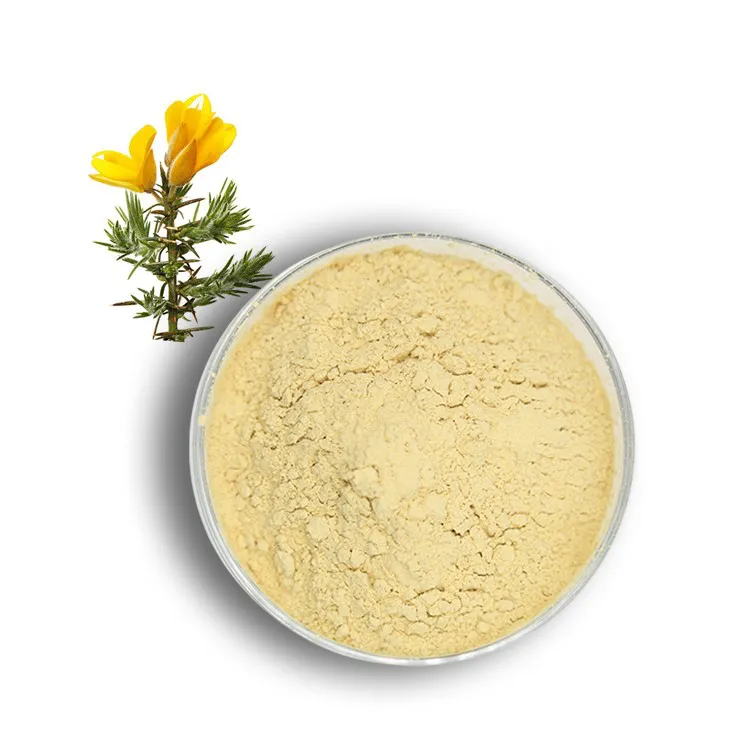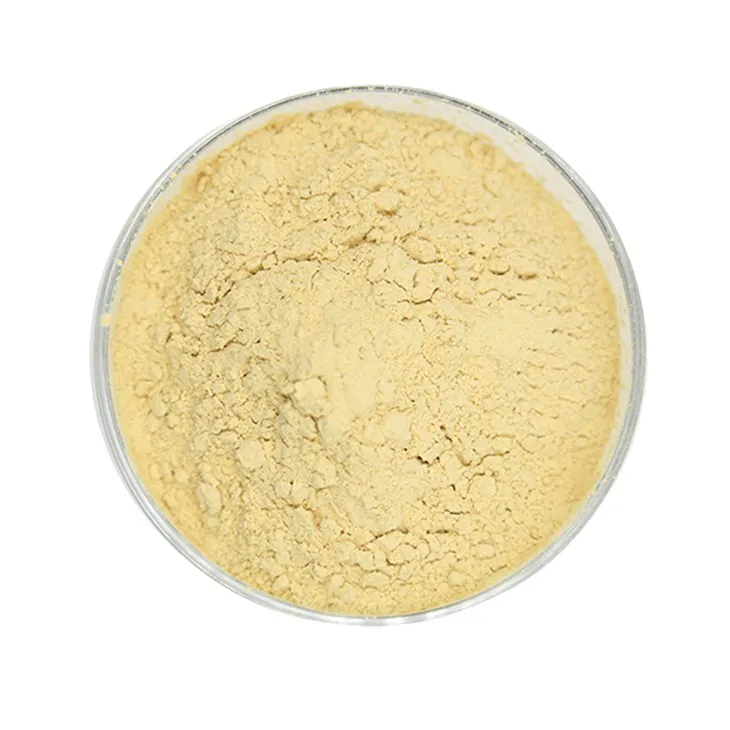- 0086-571-85302990
- sales@greenskybio.com
How do genistein manufacturers wholesale and customize products?
2024-12-10

Introduction
Genistein, a bioactive compound, has been attracting increasing attention in various fields such as the pharmaceutical and food industries. Genistein manufacturers are thus facing the important tasks of effectively conducting wholesale and custom - made product operations. This article will explore in detail how they manage these aspects.

Wholesale Operations
Supply Chain Management
1. Stable Raw Material Supply
For Genistein manufacturers, ensuring a stable supply of raw materials is crucial for large - scale wholesale. Genistein is often derived from natural sources such as soybeans. Manufacturers need to establish reliable relationships with raw material suppliers. This may involve long - term contracts or partnerships. For example, they may work with large - scale soybean farmers or agricultural cooperatives. By doing so, they can guarantee a continuous inflow of high - quality raw materials, which is essential to meet the demands of wholesale customers.
2. Inventory Management Optimization
Optimizing the inventory management system is another key aspect of supply chain management for genistein manufacturers in wholesale operations. Manufacturers need to balance between having enough inventory to meet sudden increases in demand and avoiding excessive inventory that can lead to high storage costs and potential product degradation. They can use advanced inventory management software to track inventory levels in real - time. This software can also predict future demand based on historical sales data and market trends, enabling manufacturers to make more informed decisions about inventory replenishment.
Price Setting
1. Cost Considerations
When setting wholesale prices, genistein manufacturers must first consider the cost of production. The cost of raw material procurement is a significant factor. Since genistein is derived from specific plants, the price of these raw materials can be affected by factors such as crop yields, weather conditions, and market fluctuations. For example, if there is a drought that affects soybean production, the cost of raw materials for genistein extraction may increase. In addition to raw materials, the production process also incurs costs. This includes expenses related to extraction, purification, and packaging. Quality control is another cost - related aspect. Manufacturers need to invest in quality control measures to ensure that their genistein products meet the required standards. These costs must all be factored into the price - setting process.
2. Market Competition
The genistein market is often competitive, with multiple manufacturers vying for customers. Therefore, manufacturers need to be aware of their competitors' prices when setting their own wholesale prices. They cannot set prices too high, as this may drive customers away to competitors. However, they also need to ensure that the price is profitable. A common strategy is to conduct market research to analyze the price - quality relationship in the market. Manufacturers may find a price point that offers a balance between competitiveness and profitability. For example, if a manufacturer can produce genistein with higher purity or better quality through advanced production techniques, they may be able to set a slightly higher price while still remaining competitive.

Custom - made Product Operations
Effective Customer Communication
1. Professional Sales and Technical Teams
For custom - made genistein products, having a professional sales and technical team is essential. The sales team is responsible for the initial contact with customers. They need to be able to understand the customers' needs quickly and accurately. For example, if a customer is from the pharmaceutical industry and requires genistein for a specific drug development project, the sales team needs to be able to ask the right questions to clarify the requirements. The technical team then takes over to further discuss the technical aspects. They can provide advice on whether the customer's requirements are feasible from a technical perspective and suggest possible solutions. For instance, if a customer has a specific packaging requirement for genistein, such as a special type of container to protect the product from light and moisture, the technical team can work on designing the appropriate packaging solution.
2. Understanding Customer Requirements
Manufacturers need to understand various customer requirements in custom - made product operations. Specific applications are an important consideration. For example, if the genistein is to be used in a dietary supplement, the requirements may be different from those for use in a research reagent. Packaging requirements also vary. Some customers may require eco - friendly packaging, while others may need packaging that is suitable for long - term storage. Delivery time is another crucial factor. If a customer has a tight project schedule and needs the custom - made genistein product urgently, the manufacturer needs to be able to adjust their production schedule accordingly. By thoroughly understanding these requirements, manufacturers can better meet the needs of their customers and build long - term relationships.
Intellectual Property Protection
1. Confidentiality Agreements
In custom - made product manufacturing, protecting the intellectual property of both the manufacturer and the customer is of utmost importance. Manufacturers often need to sign confidentiality agreements with customers. These agreements ensure that any information shared during the custom - made product development process, such as the customer's unique formulation requirements or their intended use of the genistein product, is kept confidential. For example, if a customer is developing a new patented drug that uses genistein as an ingredient, the manufacturer must not disclose any information about this project to third parties. This protects the customer's intellectual property rights and also helps build trust between the manufacturer and the customer.
2. Patent Applications
If the manufacturer develops new technologies or processes during the custom - made product manufacturing for genistein, they may consider applying for patents. This not only protects their own intellectual property but also gives them a competitive advantage in the market. For instance, if a manufacturer develops a new and more efficient extraction method for genistein during a custom - made project, they can patent this method. This prevents competitors from using the same method and allows the manufacturer to potentially license the technology to other companies in the future.

International Market Considerations
Compliance with International Regulations
1. European Union Regulations
In the European Union, there are strict regulations regarding the quality and safety of genistein products. Manufacturers need to ensure that their products meet the relevant standards set by the EU. For example, the EU has regulations on the maximum allowable levels of impurities in genistein products. Manufacturers must conduct thorough quality control tests to ensure that their products comply with these limits. They also need to follow regulations regarding product labeling, which includes providing accurate information about the product's composition, origin, and intended use. Failure to comply with these regulations can result in significant penalties, including product recalls and fines, and can also damage the manufacturer's reputation in the international market.
2. United States Regulations
The United States also has its own set of regulations for genistein products. The Food and Drug Administration (FDA) oversees the safety and quality of these products. Manufacturers need to ensure that their genistein products are produced in accordance with FDA - approved manufacturing processes. For example, if genistein is to be used as a dietary supplement ingredient in the US, it must meet certain purity and safety requirements. Manufacturers may need to submit product information and safety data to the FDA for review. Additionally, in the US, there are regulations regarding advertising and marketing of genistein products. Manufacturers must ensure that their marketing claims are accurate and supported by scientific evidence.
By adhering to these international regulations and standards, genistein manufacturers can not only ensure the legality of their products but also enhance their competitiveness in the international wholesale and custom - made product markets. They can build a positive brand image and gain the trust of international customers, which is essential for long - term business success in the global market.

FAQ:
What are the key factors in genistein wholesale?
Supply chain management is crucial. Manufacturers need to ensure a stable supply of raw materials for large - scale wholesale. Also, optimizing the inventory management system to cut costs is important. And price setting should consider production costs like raw material procurement, production process, and quality control, as well as market competition to set a competitive and profitable wholesale price.
How do genistein manufacturers communicate with customers for custom - made products?
Manufacturers should have a professional sales and technical team. This team can communicate effectively with customers to understand their unique requirements such as specific applications, packaging needs, and delivery time.
What should genistein manufacturers do about intellectual property protection in custom - made product manufacturing?
Manufacturers need to ensure the custom - made products and related technologies are protected. This may involve signing confidentiality agreements and applying for patents.
Why do genistein manufacturers need to comply with international regulations in the international market?
In the European Union and the United States, there are strict regulations on the quality and safety of genistein products. By adhering to these regulations, manufacturers can ensure the legality of their products and enhance their competitiveness in the international wholesale and custom - made product markets.
How can genistein manufacturers set a competitive wholesale price?
They need to consider the cost of production including raw material procurement, production process, and quality control, as well as market competition. By taking all these factors into account, they can set a price that is both competitive and profitable.
Related literature
- Genistein: Production and Market Trends"
- "Wholesale and Custom - made Operations in the Genistein Industry"
- "International Regulations Impacting Genistein Manufacturers"
- ▶ Hesperidin
- ▶ citrus bioflavonoids
- ▶ plant extract
- ▶ lycopene
- ▶ Diosmin
- ▶ Grape seed extract
- ▶ Sea buckthorn Juice Powder
- ▶ Beetroot powder
- ▶ Hops Extract
- ▶ Artichoke Extract
- ▶ Reishi mushroom extract
- ▶ Astaxanthin
- ▶ Green Tea Extract
- ▶ Curcumin Extract
- ▶ Horse Chestnut Extract
- ▶ Other Problems
- ▶ Boswellia Serrata Extract
- ▶ Resveratrol Extract
- ▶ Marigold Extract
- ▶ Grape Leaf Extract
- ▶ blog3
- ▶ blog4
- ▶ blog5
-
Pure 85% Tomentil Extract.
2024-12-10
-
Red Vine Extract
2024-12-10
-
Peppermint Extract Powder
2024-12-10
-
Fenugreek Extract Powder
2024-12-10
-
Diosmin
2024-12-10
-
Beta Carotene
2024-12-10
-
Lotus leaf extract
2024-12-10
-
Green coffee bean Extract
2024-12-10
-
Plantain extract
2024-12-10
-
Milk Thistle Extract
2024-12-10
-
Alisma Extract
2024-12-10





















